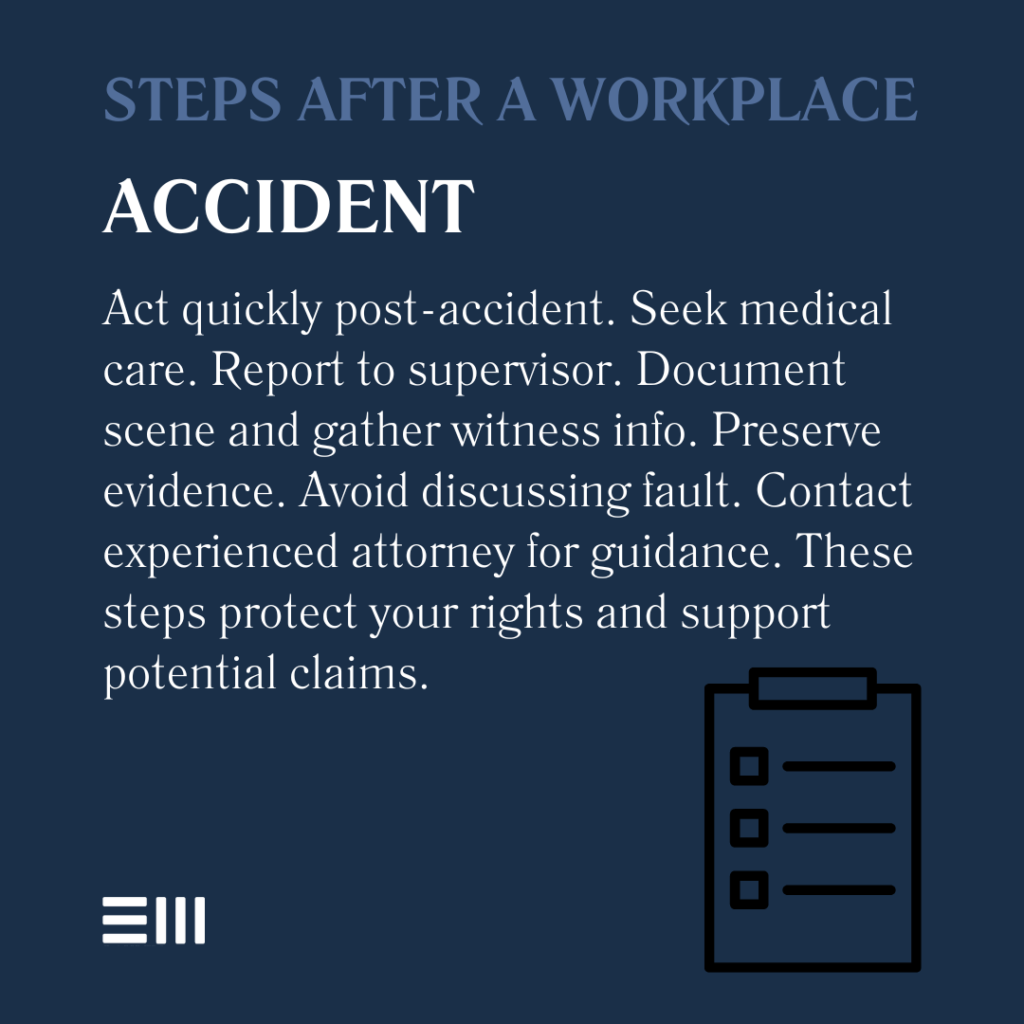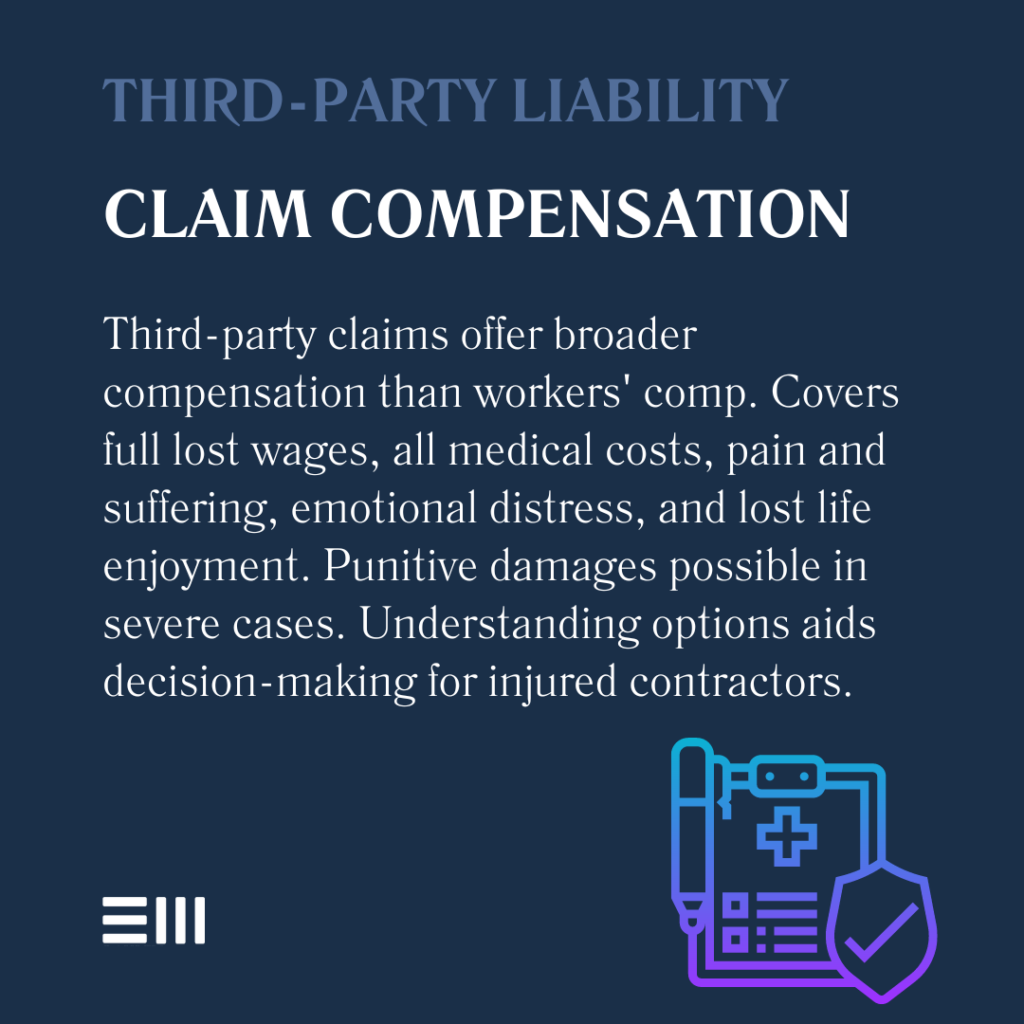
Did you know that, in 2020, there were 2.7 million nonfatal workplace injuries and illnesses reported by private industry employers?
This staggering statistic from the U.S. Bureau of Labor Statistics underscores the prevalence of workplace accidents, with contractors often facing unique challenges regarding liability and compensation.
Workplace accidents involving contractors can be complex, but understanding the intricacies of third-party liability claims is crucial for contractors injured on the job.
Understanding Workplace Accidents for Contractors
Workplace accidents can occur in various settings and circumstances, but contractors face unique risks due to the nature of their work.
These accidents may involve:
- Construction site incidents;
- Industrial accidents;
- Falls from heights;
- Equipment malfunctions; and
- Vehicle accidents while on the job.
As a contractor, you may find yourself working in unfamiliar environments or alongside employees from different companies, which can increase the potential for accidents.
Understanding the specific risks associated with your work and the legal implications of workplace accidents is essential for protecting your rights and securing fair compensation if an injury occurs.
What Are Third-Party Liability Claims?
Third-party liability claims arise when a party other than your employer or co-worker is responsible for your workplace injury.
In the context of contractor accidents, these claims can be particularly relevant.
Here’s why:
- Contractors often work with multiple entities on a single job site;
- Equipment or materials from various suppliers may be involved in the work;
- Other subcontractors or workers from different companies may be present; and
- Property owners or managers may have responsibilities for site safety.
Third-party liability claims allow injured contractors to seek compensation beyond what may be available through workers’ compensation, potentially leading to more comprehensive coverage of damages and losses.
Why Third-Party Liability Claims Matter for Contractors
Third-party liability claims are particularly important for contractors for several reasons:
- Expanded compensation options;
- Coverage for damages not included in workers’ compensation;
- Potential for higher settlement amounts;
- Accountability for negligent parties; and
- Improved workplace safety through legal action.
By pursuing a third-party liability claim, contractors can address the full scope of their injuries and losses, including pain and suffering, which is typically not covered by workers’ compensation.
Identifying Potential Third-Party Liability in Contractor Accidents
Recognizing potential third-party liability in a workplace accident is crucial for contractors.
Here are some common scenarios where third-party liability may come into play:
- Defective equipment or tools;
- Negligent property maintenance;
- Vehicle accidents involving non-employer drivers;
- Toxic substance exposure due to improper handling or storage; and
- Accidents caused by subcontractors or employees of other companies.
Identifying these situations early can help you take the appropriate legal steps to protect your rights and pursue fair compensation.
Steps to Take After a Workplace Accident as a Contractor
If you’re a contractor involved in a workplace accident, taking the right steps immediately after the incident can significantly impact your ability to file a successful third-party liability claim.
Here’s what you should do:
- Seek medical attention immediately;
- Report the accident to your supervisor or site manager;
- Document the accident scene with photos and videos, if possible;
- Collect contact information from witnesses;
- Preserve any evidence related to the accident;
- Avoid discussing fault or signing any documents without legal counsel; and
- Contact an experienced attorney specializing in workplace accidents and third-party liability claims.
Taking these steps can help preserve crucial evidence and protect your legal rights as you pursue compensation for your injuries.

Navigating the Legal Process for Third-Party Liability Claims
The legal process for third-party liability claims can be complex, especially for contractors who may be dealing with multiple parties and insurance companies.
Here’s an overview of what you can expect:
- Initial consultation with an attorney;
- Investigation of the accident and gathering of evidence;
- Identification of liable parties;
- Filing of the claim or lawsuit;
- Negotiation with insurance companies and opposing counsel;
- Possible mediation or alternative dispute resolution; and
- Trial, if a settlement cannot be reached.
Each step in this process requires careful attention to detail and a thorough understanding of Alabama law.
Working with an experienced attorney can help ensure that your rights are protected throughout the legal proceedings.
Compensation Available in Third-Party Liability Claims
One of the primary advantages of third-party liability claims for contractors is the potential for more comprehensive compensation.
Unlike workers’ compensation, which typically covers only medical expenses and a portion of lost wages, third-party claims may allow you to recover:
- Full lost wages and future earning capacity;
- Complete medical expenses, including future treatments;
- Pain and suffering;
- Emotional distress;
- Loss of enjoyment of life; and
- Punitive damages in cases of gross negligence.
Understanding the full scope of available compensation can help you make informed decisions about pursuing a third-party liability claim.

Challenges in Third-Party Liability Claims for Contractors
While third-party liability claims can offer significant benefits, they also come with unique challenges for contractors:
- Determining liability among multiple parties;
- Navigating complex contractual relationships;
- Dealing with multiple insurance companies;
- Proving negligence or fault;
- Addressing potential conflicts with workers’ compensation claims; and
- Meeting filing deadlines and legal requirements.
Overcoming these challenges requires a thorough understanding of Alabama law and the intricacies of workplace accident claims. Professional legal guidance can be invaluable in addressing these obstacles effectively.
Alabama-Specific Considerations for Contractor Accident Claims
Alabama has specific laws and regulations that can impact third-party liability claims for contractors.
Some key considerations include:
- Statute of limitations for filing claims;
- Contributory negligence laws;
- Specific safety regulations for construction and industrial work;
- Licensing requirements for contractors; and
- Interaction between workers’ compensation and third-party claims.
Understanding these state-specific factors is crucial for building a strong case and maximizing your chances of a favorable outcome.
Frequently Asked Questions About Third-Party Liability Claims for Contractors in Alabama
Third-party liability claims in Alabama tend to raise many unique questions and concerns.
For your convenience, here are answers to some of the most frequently asked questions we receive about the topic.
How Long Do I Have to File a Third-Party Liability Claim in Alabama?
In Alabama, the statute of limitations for personal injury claims, including third-party liability claims, is generally two years from the date of the accident.
However, certain circumstances may affect this timeframe. It’s crucial to consult with an attorney as soon as possible after your accident to ensure you don’t miss important deadlines.
Can I File a Third-Party Claim if I’m Receiving Workers’ Compensation?
Yes, you can typically file a third-party liability claim even if you’re receiving workers’ compensation benefits.
However, there may be implications for your workers’ compensation claim, and you may be required to reimburse a portion of the benefits received if your third-party claim is successful.
An experienced attorney can help you navigate this complex interplay between different types of claims.
What if I Was Partially at Fault for the Accident?
Alabama follows a contributory negligence rule, which means that if you are found to be even slightly at fault for the accident, you may be barred from recovering damages in a third-party liability claim.
This makes it especially important to have skilled legal representation to help establish the other party’s liability and protect your right to compensation.
How Is Liability Determined in Complex Contractor Accidents?
Determining liability in contractor accidents often involves a thorough investigation of the accident scene, review of contracts and safety protocols, analysis of witness statements, and potentially expert testimony.
Your attorney will work to identify all potentially liable parties and gather evidence to support your claim.
What Types of Evidence Are Important for My Claim?
Key evidence in third-party liability claims for contractors may include:
- Accident reports;
- Photographs and videos of the accident scene;
- Witness statements;
- Medical records and bills;
- Employment and contract documents;
- Safety inspection records; and
- Expert witness testimony.
Preserving and collecting this evidence as soon as possible after the accident is crucial for building a strong case.
Fight Harder, Fight Smarter
If you’re a contractor who has been injured in a workplace accident in Alabama, don’t navigate this complex legal landscape alone.
The experienced team at Baxley Maniscalco is here to help you understand your rights, explore your options for third-party liability claims, and fight for the compensation you deserve.
Our attorneys specialize in workplace accident cases and have a deep understanding of Alabama’s laws and regulations. We’re committed to providing personalized, compassionate representation to help you through this challenging time.
Don’t let confusion or uncertainty about your legal rights prevent you from seeking the compensation you need to recover and move forward.
Can't find what you're looking for? Search our site below.










